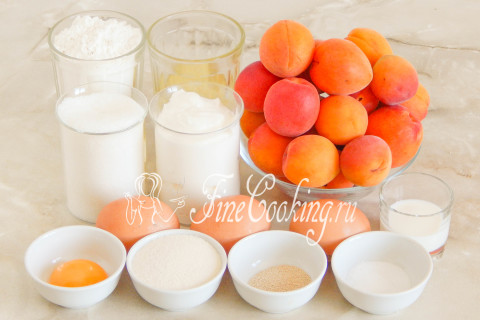Step 1
The following ingredients include the yeast dough for the cake: wheat flour, medium-fat sour cream (I have 20%), medium-sized chicken eggs (45-50 grams each), refined vegetable (I use sunflower) oil, salt, sugar and high-speed yeast. All ingredients for the dough must be at room temperature. For the filling, we will need fresh apricots (the weight of the fruit is indicated with the bone), granulated sugar and semolina. In addition, to lubricate pastries, we use egg yolk and milk (you can replace 1 chicken egg).
Step 2
First of all, in a suitable for kneading and fermentation of yeast dough, we sift the dishes (preferably twice) wheat flour. Thanks to this technique, the flour will not only be saturated with oxygen, but also leaves possible garbage. I immediately use exactly 500 grams of flour, as I constantly use the product of the same manufacturer (Lida flour), but you can leave more or less. You can, of course, immediately knead the dough on the table, but the bowl is much more convenient (for example, the same liquid components will not run away anywhere).
Step 3
Add 50 grams of sugar to flour, 1 teaspoon without a slide of salt (preferably fine grinding) and 1 teaspoon with a hill (5 grams) of high -speed yeast.
Step 4
Mix thoroughly so that all dry components are evenly distributed according to the mixture.
Step 5
We make a recess in the flour mixture, break 3 chicken eggs into it, add 200 grams of sour cream and 100 milliliters of refined vegetable oil.
Step 6
At the beginning of the batch of yeast dough, you can simply mix all the products with a fork, spoon or hand so that the flour is moistened, absorbing wet ingredients. In the presence of a bread maker or dough, the process of batch is greatly simplified and your work is minimized. You need to knead the dough for quite some time (at least 10, and better than 15 minutes) and intensively — it is advisable to do it with your hands on the table. The electric assistant will cope for 7 minutes. As a result, this is a butter of the yeast dough should become completely homogeneous, smooth, very soft and delicate, slightly sticky. We round the dough and put in a bowl lubricated with a small amount of vegetable oil (it is not indicated in the ingredients) so that it does not stick to the dishes during fermentation. We send the dough to heat for 1 hour. Where is it better to wander the test and what does a warm place mean? There are several options. First of all, in the oven with a light bulb turned on (it turns out about 28-30 degrees — the temperature ideal for fermentation of yeast dough). Then we tighten the bowl with the dough with cling film or cover with a towel made of natural fabric (flax is best suited) so that the surface does not be swollen and not covered with a crust. You can also let the dough wander in a microwave, in which we pre -boil a glass of water. The dough will rise with a door closed, and the glass will stand there. Then the bowl does not need to be closed with anything, since the water will evaporate, thereby maintaining the necessary humidity. Just make sure that no one inadvertently turns on the microwave, otherwise the dough will disappear and the pie with apricots will not work.
Step 7
After about an hour from the beginning of fermentation (time is a relative concept, it may take more or less) the yeast dough will grow perfectly, increasing 2-2.5 times. If the dough rises weakly, then you came across old yeast — increase the time of fermentation.
Step 8
We make a light degree, releasing gas, re -round the dough and again in the heat for about an hour.
Step 9
During this time, the yeast dough will rise even better, increasing in the amount of times three times, will become even more tender and fluffy.
Step 10
While the dough was approaching, we prepared apricots. They had to be washed, dry, removed, and cut the pulp with arbitrary pieces.
Step 11
Sprinkle the working surface slightly with wheat flour (the amount of flour in the ingredients is not indicated for rolling and molding, but 2-3 tablespoons are enough). We crush the dough, releasing carbon dioxide from it.
Step 12
After that, divide the yeast dough into 2 parts (approximately the same size). One piece will become an bottom of the future pie, and the second will be needed for the top and decoration. We round the dough, cover it with a towel or cling film and let it rest for 5-7 minutes. If you do not let the dough lie down a little, it will roll badly and pull it back.
Step 13
We roll one piece of dough into a layer, if necessary, puffing with flour, in size for baking shapes. I have a rectangular shape (32×22 centimeters), but round or any other is perfect. You can even bake a yeast pie with apricots right on a baking sheet.
Step 14
I advise you to cover the baking dish with parchment paper or grease with vegetable oil. We put the dough into it so that the sides are obtained.
Step 15
We cover the bottom of the future pie with semolina, thanks to which, when baking, juice from apricots will contact and the filling will not be liquid.
Step 16
We lay out apricot slices with an uniform layer.
Step 17
Sprinkle the filling of sugar, the amount of which depends on the natural sweetness of the fruits and your preferences.
Step 18
Now let's go the top of the pie. Here, design options are possible, but I suggest you make a beautiful net. The second piece of dough is also rolled into the layer, only thinner.
Step 19
With the help of such a roller we cut the dough — it turns out a rather attractive mesh. For lack of this device, you can simply make a few incisions on the surface of the workpiece so that steam comes out when baking from the pie.
Step 20
We transfer the mesh from the dough to the filling, and cut off the excess with kitchen scissors. Pinch the seams.
Step 21
From the remnants of the yeast dough, we make the decoration: roll it out and using a cookie mold we cut out any figures (I have stars).
Step 22
We put the blanks around the entire perimeter of the pie on the photo, as in the photo. Let the future cake with apricots distinguish between a warmth under a towel or cling film for about 15 minutes (while we were engaged in decoration, the main dough has already been partially approached), and in the meantime we have roared the oven (180 degrees).
Step 23
Before baking, lubricate the workpiece with a mixture of milk and egg yolk for brown crust.
Step 24
We bake a yeast pie with apricots 40-45 minutes at 180 degrees at an average level to rosy color. I have a gas oven, lower heating, without convection (it cannot be there by definition).
Step 25
Let the cake cool a little and cut it with portioned pieces. Unusually aromatic, very tasty and juicy homemade pastries for family tea drinking. Prepare for health, friends, and pleasant to you appetite!

























